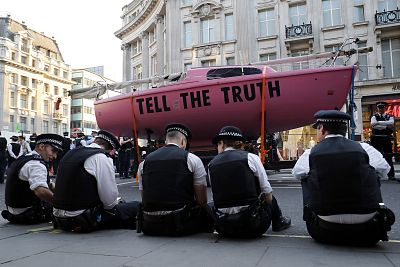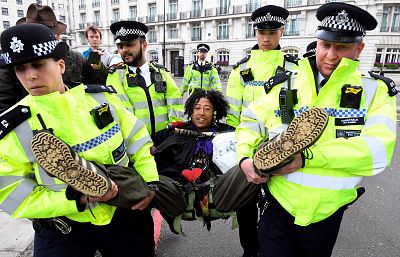After 1,000 arrests and days of disruption, one group's direct action has successfully driven climate change up the political agenda in Britain.
LONDON — A string of demonstrations that blocked bridges and major streets in central London, disrupted train services and saw over a thousand people arrested are being declared a success in forcing climate change higher up the political agenda.
Extinction Rebellion, a protest movement calling for the prevention of ecological collapse that launched in the United Kingdom last year, has inspired the support of thousands across the country, raised more than £250,000 ($322,000) and gained the attention of politicians.
News
"I think we've become hugely popular and politicians are aware of that," organizer Nuala Gathercole Lam told NBC News. "There has been a shift toward understanding the urgency of this."
The group is rallying behind warnings from scientists, the United Nations and the Intergovernmental Panel on Climate Change that significant reductions in carbon emissions must be achieved within the next 11 years to avoid devastating consequences for the planet, such as mass extinction, by the end of the century.
Demonstrators set up makeshift camps at various locations across the city including Waterloo Bridge and Marble Arch, the iconic triumphal arch near popular tourist sites including Buckingham and Kensington Palaces.
The final day of protests began Thursday with a group of seven demonstrators forming a chain outside the doors of the London Stock Exchange to highlight the negative impacts financial industries are having on the physical world, Gathercole Lam said.
Another group caused disruption by climbing on top of a train in in the city's financial center, Canary Wharf, according to the Metropolitan Police. Five people were arrested in the incident.
Protesters are demanding that the British government tell the truth about the severity of climate change, set drastic targets to reach zero carbon emissions by 2025 and establish a citizens' assembly to direct how those targets are reached.
"It seems like something that is totally unrealistic, but what is really unrealistic is that we're carrying on as business as usual," said Sarah Lummun, who works on the rebellion's political strategy.
People are sacrificing their careers and livelihoods with potential criminal records because they believe in the urgent need for action, Lummun said.
Of the over 1,000 people arrested, Met Police said as of Wednesday, 69 people were charged. A near-even split of men and women, whose ages ranged from 19 to 70, were among those arrested in that one day alone.
Conservative-leaning commentators have called the protests inconsequential and attacked them for only being supported by young, well-off liberals. Questions have been asked over why the police didn't take stronger action to clear streets and bridges.
But the net result of 10 days of disruption is a huge amount of publicity and the ear of senior politicians. The rebellion is expecting a formal invitation to meet with Michael Gove, the environment secretary, and other politicians, Lummun said. Numerous other members of parliament, mostly from the opposition Labour and Green parties, have joined the movement and spoken to demonstrators.
"On all levels, the Extinction Rebellion has been a fantastic success on raising the issue," said John Barry, a professor specializing in green political theory at Queen's University Belfast.
"I think non-violent direct action is absolutely needed to push the political system, to challenge our economic system, to create a better economy and society."
Barry rejected the idea that Extinction Rebellion was "just a niche, green, guilty middle-class protest," he said.
The group has also gained traction internationally. In Los Angeles, protesters scaled the Universal Studios globe waving green flags for Earth Day last Monday. Chapters of the group have also organized in nearly 400 locations around the world.
Although the protests are set to end Thursday, Lummun said the movement will not die down any time soon.
"If we do not act, we have no future," she said. "If the government doesn't meet our demands, we will escalate."













